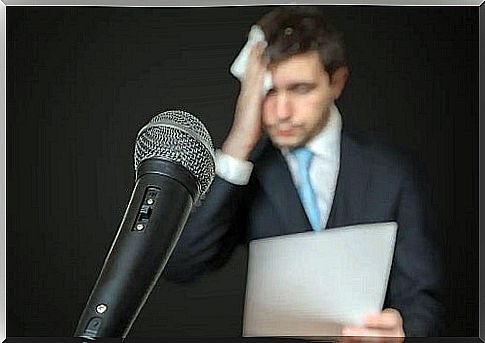What Is Glossophobia And How Can It Be Treated?

Glossophobia is an anxiety disorder that is characterized by an irrational fear of public speaking. It is also known as “stage fright”. Most people have a certain nervousness when giving a speech in front of an audience; however, it is a normal sensation that tends to occur in new situations.
The problem occurs when anxiety increases significantly and occurs simultaneously with other uncomfortable symptoms. In other words, nervousness turns into paralyzing, irrational and uncontrollable fear.
The individual fears that others will judge him and reject him. He thinks he’s going to make fun of himself or lose control. These irrational thoughts increase the level of anxiety, which generates an intense desire to run away from the stage.
What is glossophobia and what does it entail?
Glossophobia is a specific phobia in social anxiety disorders. This means that it manifests itself in isolation, and people who experience it can feel comfortable in other social situations, such as attending an event or meeting friends.
However, those who suffer from social phobia or an irrational fear of interacting with other people often experience so-called “stage fright”. However, it may happen that someone with a social phobia is not afraid to go on stage, but this is not common.

The main symptoms
The most common symptom among people with glossophobia is the desire to avoid speaking in front of other people. This fear can manifest itself in front of a large audience, in front of a crowded audience or in front of a very small group of people.
Other symptoms that occur when individuals speak in public are the following:
- Excessive sweating
- shaking
- Redness of the face
- Tachycardia
- Increased respiratory rate
- Difficulty breathing or suffocation
- Dizziness or fainting
- Nausea or vomiting
- Digestive disorders
- Difficulties in maintaining a speech
- Mental confusion
- Depersonalization
- Fear of losing control
These symptoms should not occur at the same time. Some may have sweaty hands and a red face, while others may have other symptoms without these features.
What causes the fear of public speaking?
There is not a single cause that explains why a person manifests or does not manifest glossophobia. In fact, in many cases, this social phobia occurs due to the interaction of several factors: for example, the genetic predisposition to have difficulty tolerating high levels of stress. Also, glossophobia can occur after a traumatic situation in front of others.
There are people who tend to avoid public speaking. This is the case for those who are overly shy. The situation could also occur in those with visible trauma, disease or deformity.
Patients with psychiatric disorders, such as depression and schizophrenia, or those with language problems, such as stuttering, are more likely to suffer from glossophobia. People with low self-esteem have a predisposition to this condition.
Treatments for glossophobia
Now that we have established what glossophobia is, we will discuss its treatment.
Glossophobia is a disorder that can greatly limit people’s lives. For this reason, it is recommended to seek the intervention of a psychologist.
The most common treatment for treating phobias is cognitive-behavioral therapy. This involves the use of techniques such as systematic desensitization, in which the person is gradually exposed to the situation that causes fear. It also uses direct exposure when the affected person is directly confronted with the problematic situation.
Cognitive-behavioral therapy focuses on cognitive restructuring, ie on changing irrational ideas. The following are also useful:
- Short strategic therapy
- Acceptance and commitment therapy
- EMDR, which in Spanish means desensitizing and reprocessing eye movement
- Psychopharmaceuticals, such as benzodiazepines or beta-adrenergic blockers – useful against physiological symptoms such as tachycardia or excessive sweating

Tips for preparing before a speech
There are a number of strategies to prepare you for a presentation or speech. Putting them into practice helps to alleviate nervousness.
- Thoroughly prepare the presentation. Improvisation can increase anxiety.
- Practice relaxation techniques. You can do a mindfulness session and practice Jacobson’s progressive muscle relaxation technique or a mindfulness exercise that allows you to focus on the present moment.
- Get rid of irrational ideas. The mind can send biased and broken messages of reality.
- Accept that it can’t be perfect. Exaggerated claims greatly increase anxiety. There may be errors. To make a mistake is much better than doing nothing.
- Try to enjoy the experience. Focus on the experience to overcome the fear.
Seek help to overcome glossophobia
If after applying these techniques, the level of anxiety continues to be high or limiting, it is best to seek professional help. There are many therapeutic options to overcome glossophobia. A mental health specialist will be able to determine the best treatment, depending on the characteristics of each case.









